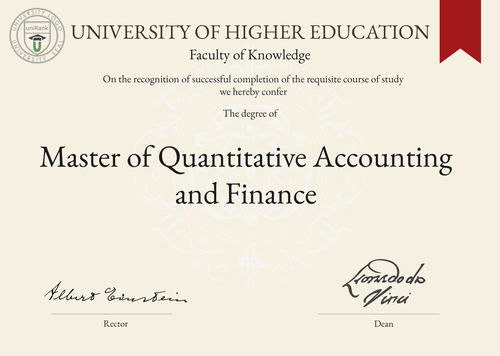
Master of Quantitative Accounting and Finance (MQAF)
Guide to Master of Quantitative Accounting and Finance Program/Course/Degree
Master of Quantitative Accounting and Finance (MQAF)

Program Name:
Master of Quantitative Accounting and FinanceProgram or Degree abbreviation:
MQAFDuration range:
1-2 yearsTuition range:
Varies by country and universityOverview:
The Master of Quantitative Accounting and Finance program is designed to provide students with advanced knowledge and skills in quantitative analysis, accounting principles and financial management. This program combines theoretical concepts with practical applications to prepare graduates for careers in finance, accounting and related fields.Curriculum Overview by year:
The curriculum is typically divided into core courses and elective courses. In the first year, students focus on building a strong foundation in quantitative analysis, accounting principles and financial management. In the second year, students have the opportunity to specialize in areas such as financial modeling, risk management, or investment analysis through elective courses.Key Components:
The key components of the Master of Quantitative Accounting and Finance program include courses in financial accounting, managerial accounting, financial management, quantitative analysis, financial modeling, risk management and investment analysis. Students also have the opportunity to gain practical experience through internships or research projects.Career Prospects:
Graduates of the program can pursue careers in various industries, including banking, investment management, consulting and corporate finance. They may work as financial analysts, risk managers, investment bankers, or financial consultants, among other roles.Salary Expectations:
Salary expectations for graduates of the Master of Quantitative Accounting and Finance program can vary depending on factors such as location, industry and experience. However, professionals in this field generally earn competitive salaries, with the potential for high earning potential as they progress in their careers.Conclusions:
It is important to note that the duration, tuition fees, curriculum, key components, career prospects and salary expectations of the Master of Quantitative Accounting and Finance program can vary depending on the chosen country or location of study, as well as the chosen university. Prospective students are encouraged to research and compare different programs to find the one that best fits their needs and goals. Visitors can search for where this specific degree (Master of Quantitative Accounting and Finance) is offered anywhere in the world through the uniRank World Universities Search Engine.World Universities Search Engine
search for Master of Quantitative Accounting and Finance (MQAF) and add the Location (country, state etc.) or specific University you are interested in studying at.
Query examples:
- Master of Quantitative Accounting and Finance (MQAF) United States
- Master of Quantitative Accounting and Finance (MQAF) United Kingdom online
- Master of Quantitative Accounting and Finance (MQAF) Australia international students
- Master of Quantitative Accounting and Finance (MQAF) University of California
- Master of Quantitative Accounting and Finance (MQAF) University of London tuition fees
- Master of Quantitative Accounting and Finance (MQAF) University of Sydney scholarships
Share Program/Course
Interesting? Share this program/course/degree info with your friends now.